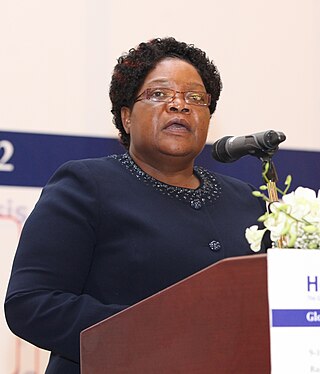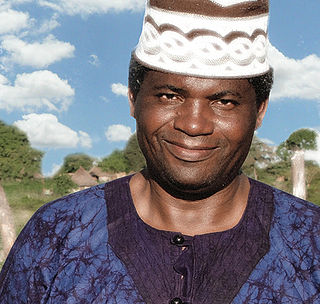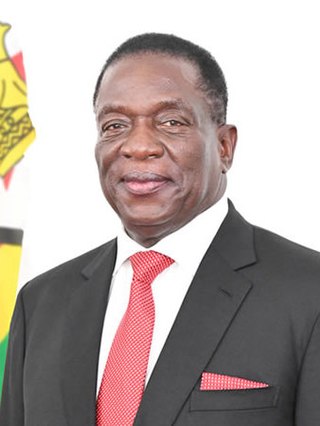Related Research Articles

Mbira are a family of musical instruments, traditional to the Shona people of Zimbabwe. They consist of a wooden board with attached staggered metal tines, played by holding the instrument in the hands and plucking the tines with the thumbs, the right forefinger, and sometimes the left forefinger. Musicologists classify it as a lamellaphone, part of the plucked idiophone family of musical instruments. In Eastern and Southern Africa, there are many kinds of mbira, often accompanied by the hosho, a percussion instrument. It is often an important instrument played at religious ceremonies, weddings, and other social gatherings. The "Art of crafting and playing Mbira/Sansi, the finger-plucking traditional musical instrument in Malawi and Zimbabwe" was added to the UNESCO Representative List of the Intangible Cultural Heritage of Humanity in 2020.

Zimbabwean music is heavily reliant on the use of instruments such as the mbira, Ngoma drums and hosho. Their music symbolizes much more than a simple rhythm, as the folk and pop style styled music was used as a symbol of hope for Zimbabweans looking to gain independence from Rhodesia. Music has played a significant role in the history of Zimbabwe, from a vital role in the traditional Bira ceremony used to call on ancestral spirits, to protest songs during the struggle for independence. The community in Zimbabwe used music to voice their resistance to their oppression, as one of the only weapons they had available to fight back with. In the eighties, the Music of Zimbabwe was at the center of the African Music scene thanks to genres such as Sungura and Jit. However, several performers were banned by state TV and radio leading to the closing of several music venues.

Evan Ziporyn is an American composer of post-minimalist music with a cross-cultural orientation, drawing equally from classical music, avant-garde, various world music traditions, and jazz. Ziporyn has composed for a wide range of ensembles, including symphony orchestras, wind ensembles, many types of chamber groups, and solo works, sometimes involving electronics. Balinese gamelan, for which he has composed numerous works, has compositions. He is known for his solo performances on clarinet and bass clarinet; additionally, Ziporyn plays gender wayang and other Balinese instruments, saxophones, piano & keyboards, EWI, and Shona mbira.
Leonard "Karikoga" Zhakata is a Zimbabwean musician and singer. He writes and sings mainly in his native Shona tongue. Zhakata, who adorns trademark glittering outfits, is best known for his hits Hupenyu Mutoro, Batai Mazwi and "Gomba Remarara". However, it was his 1994 smash hit Mugove, from the album Maruva Enyika, which evaded government censorship and propelled him to national stardom.

Joice Runaida Mujuru, also known by her nom-de-guerre Teurai Ropa Nhongo, is a Zimbabwean revolutionary and politician who served as Vice-President of Zimbabwe from 2004 to 2014. Previously she had served as a government minister. She also served as Vice-President of ZANU–PF. She was married to Solomon Mujuru until his death in 2011 and was long considered a potential successor to President Robert Mugabe, but in 2014 she was denounced for allegedly plotting against Mugabe. As a result of the accusations against her, Mujuru lost both her post as Vice-President and her position in the party leadership. She was expelled from the party a few months later, after which she formed the new Zimbabwe People First party.
Shona music is the music of the Shona people of Zimbabwe. There are several different types of traditional Shona music including mbira, singing, hosho and drumming. Very often, this music will be accompanied by dancing, and participation by the audience. In the Shona style of music, there is little distinction between the performer and the audience. Both are often actively involved in the music-making and both are important in the Shona religious ceremonies.
Ephat Mujuru (1950–2001), was a Zimbabwean musician, one of the 20th century's finest players of the mbira, a traditional instrument of the Shona ethnic group of Zimbabwe.
Abraham Dumisani Maraire, known to friends as "Dumi", was a Zimbabwean musician. He was a master performer of the mbira, a traditional instrument of the Shona people of Zimbabwe. He specialized in the form of mbira called nyunga nyunga, as well as the Zimbabwean marimba. He introduced Zimbabwean music to North America, initiating a flourishing of Zimbabwean music in the Pacific Northwest that continues into the 21st century.

The Shona people are a Bantu ethnic group native to Southern Africa, primarily living in Zimbabwe where they form the majority of the population, as well as Mozambique, South Africa, and a worldwide diaspora. There are five major Shona language/dialect clusters: Manyika, Karanga, Zezuru, Korekore, and Ndau.

Stella Chiweshe was a Zimbabwean musician. She was known internationally for her singing and playing of the mbira dzavadzimu, a traditional instrument of the Shona people of Zimbabwe. She was one of few female players, and learned to play from 1966 to 1969, when other women did not.
Kutsinhira Cultural Arts Center is a music center located in Eugene, Oregon, United States, dedicated to the music and people of Zimbabwe. Kutsinhira offers classes in Zimbabwean marimba, mbira, drumming, singing, and dancing. The center also tries to bring Zimbabwean teachers to Oregon. Kutsinhira members have been active participants in ZimFest.

Cosmas Magaya was a Zimbabwean mbira musician.
Chartwell Shorayi Dutiro was a Zimbabwean musician, who started playing mbira when he was four years old at the protected village, Kagande; about two hours drive from Harare, where his family was moved by the Salvation Army missionaries during the Chimurenga. Even though the missionaries had banned traditional music, he learned to play from his brother and other village elders. His mother also encouraged him through her singing of traditional songs.

Emmerson Dambudzo Mnangagwa is a Zimbabwean politician who is serving as the third president of Zimbabwe since 2017. A member of ZANU–PF and a longtime ally of former President Robert Mugabe, he held a series of cabinet portfolios and he was Mugabe's first-vice president from 2014 until 2017, when he was dismissed before coming to power in a coup d'état. He secured his first full term as president in the disputed 2018 general election. Mnangagwa was re-elected in the August 2023 general election with 52.6% of the vote.

Forward Kwenda is a mbira performer from Zimbabwe. He was given the name "Forward" due to his involvement in many activities including his performances for guerrilla forces during the Rhodesian Bush War.
Articles related to Zimbabwe include:

Chiwoniso Maraire was a Zimbabwean singer, songwriter, and exponent of Zimbabwean mbira music. She was the daughter of Zimbabwean mbira master and teacher Dumisani Maraire. Describing the mbira, an instrument traditionally used by male musicians, she said, "It is like a large xylophone. It is everywhere in Africa under different names: sanza, kalimba, etc. For us in Zimbabwe it is the name for many string instruments. There are many kinds of mbiras. The one that I play is called the nyunga nyunga, which means sparkle-sparkle."

Peter Mujuru, known by his mononym Mashasha, is a Zimbabwean musician, bass guitarist, singer, songwriter and producer based in the UK. He is widely regarded as an original and important new voice in African music. His debut studio album, Mashasha, which was released by Elegwa Music in 2011; it was acclaimed by critics internationally and won a Zimbabwe Music and Arts (ZIMAA) award for Best Album.

Ruvimbo Hope Masike, professionally known as Hope Masike is a Zimbabwean musician and dancer. She is known as "The Princess of Mbira" and her music has its roots both in traditional and modern African culture. Hope is also the lead singer for Monoswezi. She initially studied Fine Art at Harare Polytechnic.
References
- ↑ "MIT Center for Art, Science & Technology Visiting Artist - Fradreck Mujuru and Erica Azim". Arts at MIT. Retrieved 2024-10-03.
- ↑ Standard, The. "Mbira takes US by storm". The Standard. Retrieved 2024-10-03.